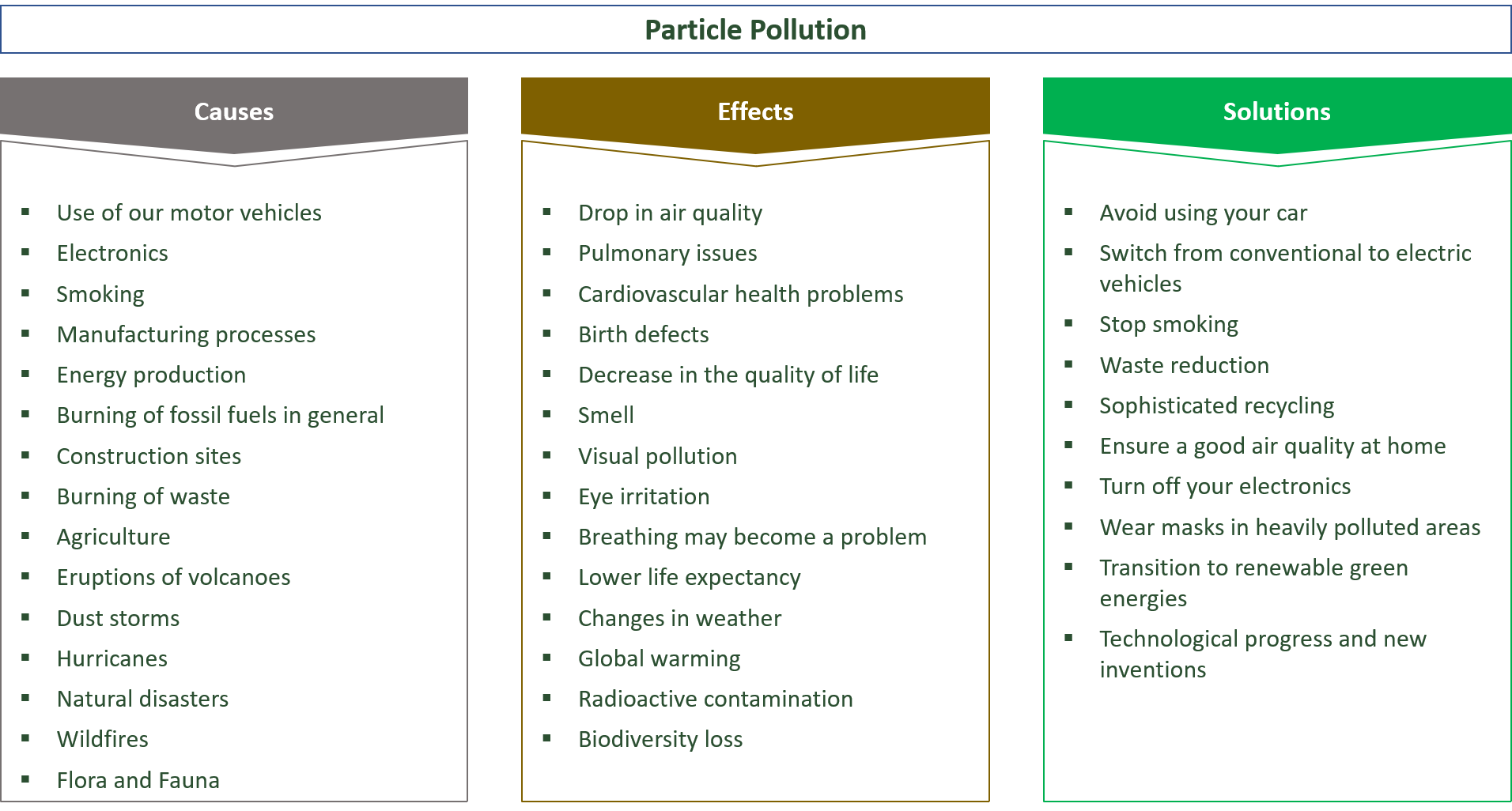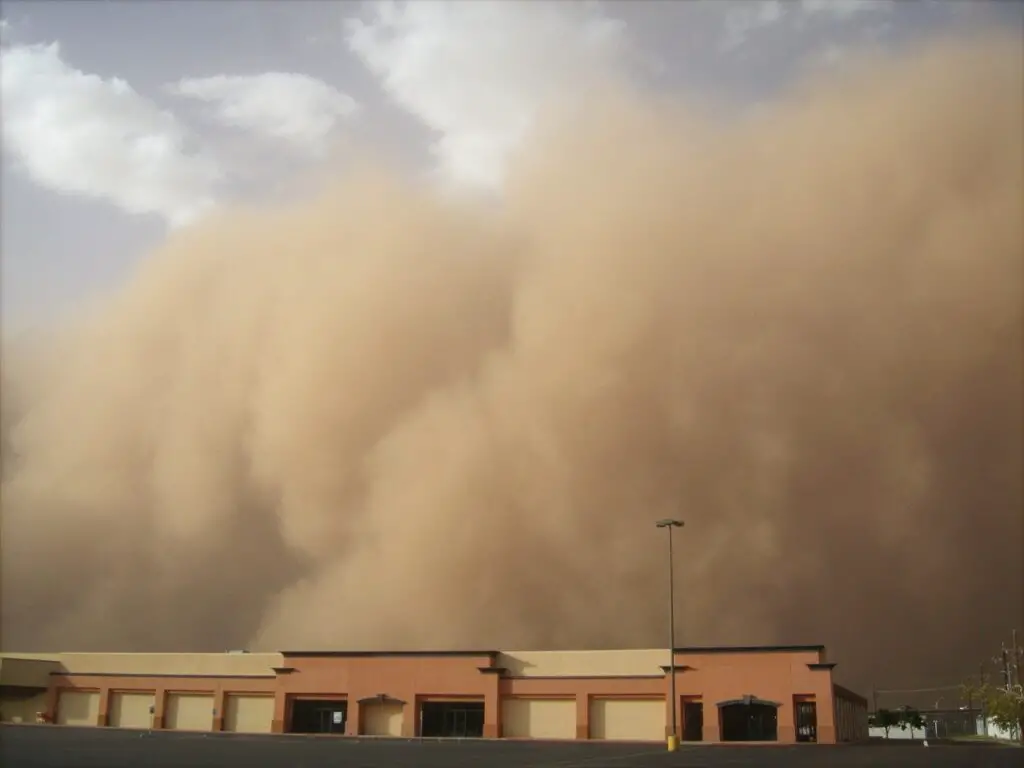“There is no threshold level of fine particle pollution below which health risk reductions are not achieved by reduced exposure.”
Gina McCarthy, Public Servant
Particle Pollution: Causes, Effects & Solutions

Particle pollution (sometimes also referred to as particulate pollution or particulate matter) can be defined as tiny pieces (so-called particles) of liquids or solids in our air.
This can include smoke, dust, dirt or soot. Even though particle pollution is not considered to be a major environmental problem by most people, it can still have serious adverse consequences for our planet as well as for our health.
In this article, the causes, effects and solutions for particle pollution are examined.
Audio Lesson
Contents
Causes for Particle Pollution
- Use of our motor vehicles
- Electronics
- Smoking
- Manufacturing processes
- Energy production
- Burning of fossil fuels in general
- Construction sites
- Burning of waste
- Agriculture
- Eruptions of volcanoes
- Dust storms
- Hurricanes
- Natural disasters
- Wildfires
- Flora and Fauna
Use of our motor vehicles
One major cause of particle pollution is the use of our cars or other vehicles that are operated by fossil fuels.
In the combustion process of fossil fuels, harmful gases and particles are emitted into our atmosphere.
Since our world population is growing, also the number of motor vehicles is growing as well.
This further exacerbates the particle pollution issue since with more motor vehicles on our streets, also the level of particulate matter increases.
Electronics
Electronics also play a role in the particulate pollution context.
For instance, many electronic devices emit ultrafine particles into the air over time.
You will not be able to see those fine particles.
However, they are present and if you use many different electronic devices on a daily basis, chances are that you also significantly contribute to particulate matter.
Smoking
When it comes to particulate matter, only few people might think of smoking as a big cause for it.
However, since billions of people on our planet are smoking cigarettes, this adds up to significant particle pollution on a global scale.
Moreover, apart from particle pollution, smoking and the incorrect disposal of cigarettes can have serious adverse environmental effects on our ecosystems.
Manufacturing processes
Most manufacturing companies still rely on fossil fuels in their production processes.
The use of fossil fuels is quite convenient and efficient since all the infrastructure around it has been optimized over the past decades.
Therefore, it would imply a great effort for companies to refrain from the use of fossil fuels in industrial production processes.
However, the excessive use of fossil fuels is a main driver when it comes to particle pollution.
Through the combustion and processing of fossil fuels, large amounts of particles are emitted into the air, which leads to significant particle pollution and to the related adverse effects.
Energy production
Since a big fraction of energy is still produced with fossil fuels, also the level of particle pollution that comes from energy production processes is significant.
As we already know, the combustion of fossil fuels also implies the emission of harmful substances into our atmosphere.
In turn, this also implies a high density of harmful particles in our air.
Burning of fossil fuels in general
In general, the burning of fossil fuels also implies significant air and particle pollution and therefore also drastically lowers our overall air quality.
Thus, several industries and also private persons who use fossil fuels will contribute to the particulate matter problem to a certain extent.
Construction sites
If you have ever had a look at construction sites, you will soon have realized that this kind of work implies the production of plenty of dust.
You might have even been forced to cover your mouth and nose or to close your eyes due to the unpleasant particle pollution that can come from those construction sites.
Thus, depending on the sort of construction, those construction sites can also play a significant role in the formation of particle pollution, especially if you live close to one of those big construction sites since your house might be covered in dust on a daily basis.
Burning of waste
Since our world population is growing on a continuous basis, also the overall global amount of waste increases dramatically.
In order to get rid of this waste, it will be either disposed into landfills or has to be burned.
However, through the burning of waste, large amounts of harmful substances are emitted into our atmosphere.
This also includes large amounts of particles, which in turn can contribute to significant particle pollution, especially in areas where the burning of waste is quite prevalent.
Agriculture
Another significant source of particle pollution is agriculture. In agricultural processes, several kinds of particles are emitted into our atmosphere.
For instance, through the use of fertilizers and pesticides, fine particles are emitted into the air.
Moreover, through storms, a much higher amount of those particles may be spread.
In addition, also the livestock may emit significant amounts of methane and other gases, which may further exacerbate the particulate matter issue.
Eruptions of volcanoes
Apart from the several man-made causes that can be responsible for particulate matter, there are also many natural causes.
For instance, volcano eruptions may also contribute to significant particle pollution since in the eruption process, large amounts of ash and other particles are emitted into the air.
Especially people who live close to those eruptions may significantly suffer from a drop in air quality.
Dust storms
Dust storms are another natural phenomenon that can lead to significant particle pollution.
Through dust storms, large amounts of fine particles are carried over quite long distances and whole cities are often covered in a layer of dust and other particles through those storms.
Thus, depending on where you live, you might also significantly suffer from particle pollution that is due to sand storms.
Hurricanes
Hurricanes and other heavy winds may also lead to significant particle pollution.
Especially in regions with a low population density, those storms may be able to swirl up plenty of dirt and other particles and carry them over long distances.
Thus, regions that are hit by hurricanes may often also suffer from particle pollution.
Natural disasters
In general, natural disasters of many sorts have the potential to lead to all sorts of pollution.
Among general destruction and other issues, this also includes significant amounts of particle pollution since natural disasters are forces that are able to move large amounts of dirt, dust and other particles into our atmosphere.
Wildfires
Another significant cause of particulate pollution are wildfires.
When whole forests are destroyed through wildfires, large amounts of particles are emitted into our atmosphere.
Thus, apart from the serious adverse effects on our environment that are related to the destruction of our forests, wildfires can also imply serious particle pollution.
Flora and Fauna
Even though our animals and plants are crucial for the stability of our ecosystems, they also often emit certain particles into our atmosphere.
For instance, some plants will release pollen or other things into the air.
Some areas are literally covered by dense dust if the concentration of those plants is high enough.

Effects of Particulate Matter
- Drop in air quality
- Pulmonary issues
- Cardiovascular health problems
- Birth defects
- Decrease in the quality of life
- Smell
- Visual pollution
- Eye irritation
- Breathing may become a problem
- Lower life expectancy
- Changes in weather
- Global warming
- Radioactive contamination
- Biodiversity loss
Drop in air quality
Particle pollution can have many adverse effects. In general, high levels of particle pollution can also imply a significant drop in air quality.
For instance, imagine you live in a big city and the city is literally covered in smog on a daily basis during rush hour.
Chances are that you might suffer from a significant drop and from other issues related to particle pollution.
Pulmonary issues
There are also many adverse health effects related to particle pollution.
Significant particle pollution can increase the chances of lung cancer or other pulmonary diseases like asthma.
Thus, if you live in regions where particle pollution is a big problem, you should think about protecting yourself against it in order not to suffer from pulmonary problems.
Cardiovascular health problems
Particle pollution may not only increase the chances for pulmonary diseases, studies have shown that a bad air quality due to particulate matter may also increase the probability of serious cardiovascular problems, including strokes and heart attacks.
Therefore, although particle pollution is not considered to be a major problem by many people, it can be quite dangerous for our health and we should take appropriate measures to protect ourselves.
Birth defects
Air and particle pollution are also associated with a higher probability for birth defects.
Many scientists believe that air quality has a major effect even on unborn children and women who live in areas with high levels of particle pollution may have a higher chance for birth complications.
Moreover, chances might be higher that their child may suffer from health issues of some sort.
Decrease in the quality of life
Significant particle pollution may also lead to a lower quality of life for locals as well as for tourists.
For instance, imagine you live in a city which suffers from heavy smog and other sorts of particle pollution.
Chances are that your quality of life will be lower compared to a state where you could enjoy fresh air.
Also, tourists often want to visit nice places where they can enjoy nature and recover from the stress back home.
However, those tourists may be quite disappointed if they experience significant air and particle pollution instead of untouched nature.
Smell
Depending on the sort of particle pollution, it may also cause significant smell.
For instance, in some industrial processes, the gases and particles that are emitted into our atmosphere may lead to serious level of smell.
Moreover, the burning of waste is another prominent example that can lead to serious levels of unpleasant smell.
Thus, people who are living in areas that are close to those facilities may significantly suffer from high levels of smell.
Visual pollution
The emission of large amounts of bigger particles may also lead to serious visual pollution.
A prominent example of this is the smog that forms over big cities on a regular basis during rush hour.
This smog is nothing but particles that are emitted in large amounts by our motor vehicles and also by industrial processes.
Thus, especially in big cities, particle pollution may also contribute to significant visual pollution.
Eye irritation
For sensitive people, particle pollution can also lead to significant eye irritations.
This is especially true for people living in areas that suffer from extremely high levels of particle pollution.
This is usually the case in areas with a high population density and where a high number of motor vehicles are used on a daily basis.
Thus, particle pollution may further lower the quality of life of many people due to eye irritation, which in turn may also lead to other health issues related to the vision of people.
Breathing may become a problem
Depending on the level of particle pollution, people may also have problems getting enough fresh air, which may lead to breathing problems.
Especially for older people or for people who already suffer from other pulmonary issues, those breathing issues might lead to serious health problems.
For instance, people may collapse if they do not get enough fresh air since their organism may not work properly without enough oxygen.
Lower life expectancy
In general, due to all those factors mentioned before, people who live in regions with significant particle pollution may also suffer from a much lower life expectancy.
Many of them will die from heart conditions, pulmonary diseases or other health problems.
Thus, if you want to assure a high life expectancy for yourself, it might not be the best idea to settle down in cities with high levels of air and particle pollution.
Changes in weather
Particle pollution may also be able to alter the weather conditions in certain areas.
If large amounts of particles are emitted into our atmosphere, this may also affect the formation of clouds and may change the chances for rain.
In turn, this may also significantly affect farmers since their farming conditions may be altered as well and their crop yields may decrease due to that.
Global warming
Particle pollution can also contribute to the global warming problem.
Large amounts of those particles in our atmosphere can lead to a state where the heat that comes from the sun will no longer be able to leave our planet and our earth may heat up due to that.
Thus, if the level of particle pollution is too big on a global scale, this may also significantly speed up global warming.
Radioactive contamination
Some fine particles are also radioactive and if too many of those particles are released into the air through industrial processes, chances are that some areas get significantly contaminated by those radioactive components, which may lead to all sorts of adverse health effects for people living in those regions.
Biodiversity loss
Not only we as humans greatly suffer from particle pollution, but also our animals and plants will be affected.
For instance, if the natural living conditions are altered due to particulate matter, chances are that reproduction rates of animals and plants may decline since many animals and plants are quite sensitive to changes in their natural living conditions.
Thus, in the long run, particulate pollution may also lead to a significant loss in biodiversity.

Solutions for Particulate Matter
- Avoid using your car
- Switch from conventional to electric vehicles
- Stop smoking
- Waste reduction
- Sophisticated recycling
- Ensure a good air quality at home
- Turn off your electronics
- Wear masks in heavily polluted areas
- Transition to renewable green energies
- Technological progress and new inventions
Avoid using your car
As we have seen before, particle pollution can have many adverse effects, not only for us humans but also for our planet.
Thus, it is crucial to take appropriate countermeasures in order to mitigate particle pollution.
One thing that everyone of us can do is to refrain from using our cars.
Since our motor vehicles are a major factor when it comes to particulate matter, going by public transport instead of your car can greatly reduce particle pollution.
Even better would be if you go by bike since it implies no particle pollution at all.
Of course, this may not be possible in every region since in some remote places, the use of cars may be unavoidable due to the bad public transport systems and the long distances.
Switch from conventional to electric vehicles
If you are not able to refrain from using your car due to various reasons, you could still reduce the particle pollution problem to a certain extent by switching from conventional cars to electric cars.
Electric vehicles emit lower amounts of particles and therefore, the particle pollution issue can be mitigated to a certain extent.
However, electric cars cannot be considered to be entirely eco-friendly yet since for the production of energy, large amounts of fossil fuels are still used.
However, this may change in the near future and if we are able to produce energy from green energy sources, electric cars will be much better for our environment compared to fossil fuels cars.
Thus, if you switch right now or in the near future, you will be able to significantly lower the particle pollution problem and you will also be able to improve your ecological footprint.
Stop smoking
If you smoke on a regular basis, you may also consider quitting smoking.
This may not only reduce the particle pollution problem to a certain extent, it will also significantly improve your overall health since smoking is quite bad for you and can contribute to all sorts of serious health problems.
Waste reduction
Another crucial step in order to mitigate the particulate matter problem is to reduce our waste production.
In our daily life, we often buy food and other products that are wrapped in excessive amounts of plastic or other materials.
However, those wrappings will lead to serious amounts of household waste.
Moreover, many of us also throw away plenty of food, which leads to additional waste at home.
Since part of this waste has to be burned and the burning of waste implies serious particle pollution, we should all try to avoid waste on a daily basis in order to reduce the particle pollution problem.
Sophisticated recycling
In order to reduce the particulate pollution problem, it is also crucial that we reuse and recycle our products in an efficient manner in order to avoid waste.
This could mean that you give away your old things to family or friends.
In case nobody wants to use your old things anymore, at least make sure that you separate your waste properly in order to make it suitable for recycling purposes.
Ensure a good air quality at home
If you live in a region where particle pollution is a big problem, you should also take measures in order to ensure a high air quality at home.
This can include installing sophisticated filter systems in order to keep out harmful particles of many sorts. It could also mean that you avoid opening windows during rush hour.
By taking those measures, you could ensure a high air quality at home, even though you might live in areas that are heavily affected by particulate matter.
Turn off your electronics
Since many electronic devices emit particles into the air, you may also want to turn off your electronic devices from time to time, especially if you do not need them at all.
One prominent example is to turn off your smartphone at nighttime.
This may not only mitigate the particle pollution to a certain extent, it might also improve your sleeping quality and your overall quality of life since you will feel much better if you are not distracted by sounds from your smartphone at night.
Wear masks in heavily polluted areas
If you live in an area where you suffer from significant air and particle pollution, you might also consider wearing a mask, especially if you have to commute during rush hour in order to protect your health and to avoid serious pulmonary or cardiovascular diseases.
Transition to renewable green energies
As we have seen, there are several measures everyone of us can take to mitigate the particle pollution problem.
However, there are also some measures that have to be taken on a global scale in order to make a really big impact.
One of those measures against particle pollution is to switch from fossil to alternative energy sources. By doing so, we could significantly reduce the particle pollution problem since fewer fossil fuels would be burned.
Technological progress and new inventions
Another important measure to mitigate particulate pollution is inventing new sophisticated technologies.
This will be crucial for humanity, not only to reduce particle pollution, but also to solve all the other environmental problems on a global scale.
Our technological progress will be the only thing that could make the living on our planet sustainable in a long-term manner and therefore, we as humanity should spend large amounts of money on the development of those sophisticated technologies.
Conclusion
Particle pollution is a serious problem that can lead to many health issues.
It can also contribute to many environmental problems.
Thus, it is crucial that everyone of us takes measures in our daily lives in order to mitigate the particulate matter problem to a certain extent.
Moreover, governments around the world have to set an effective regulatory framework so that inventions that aim to reduce particle pollution are encouraged.
Sources
https://www.epa.gov/pmcourse/what-particle-pollution
https://en.wikipedia.org/wiki/Particulate_pollution
https://www.cdc.gov/air/particulate_matter.html

About the author
My name is Andreas and my mission is to educate people of all ages about our environmental problems and how everyone can make a contribution to mitigate these issues.
As I went to university and got my Master’s degree in Economics, I did plenty of research in the field of Development Economics.
After finishing university, I traveled around the world. From this time on, I wanted to make a contribution to ensure a livable future for the next generations in every part of our beautiful planet.
Wanna make a contribution to save our environment? Share it!
